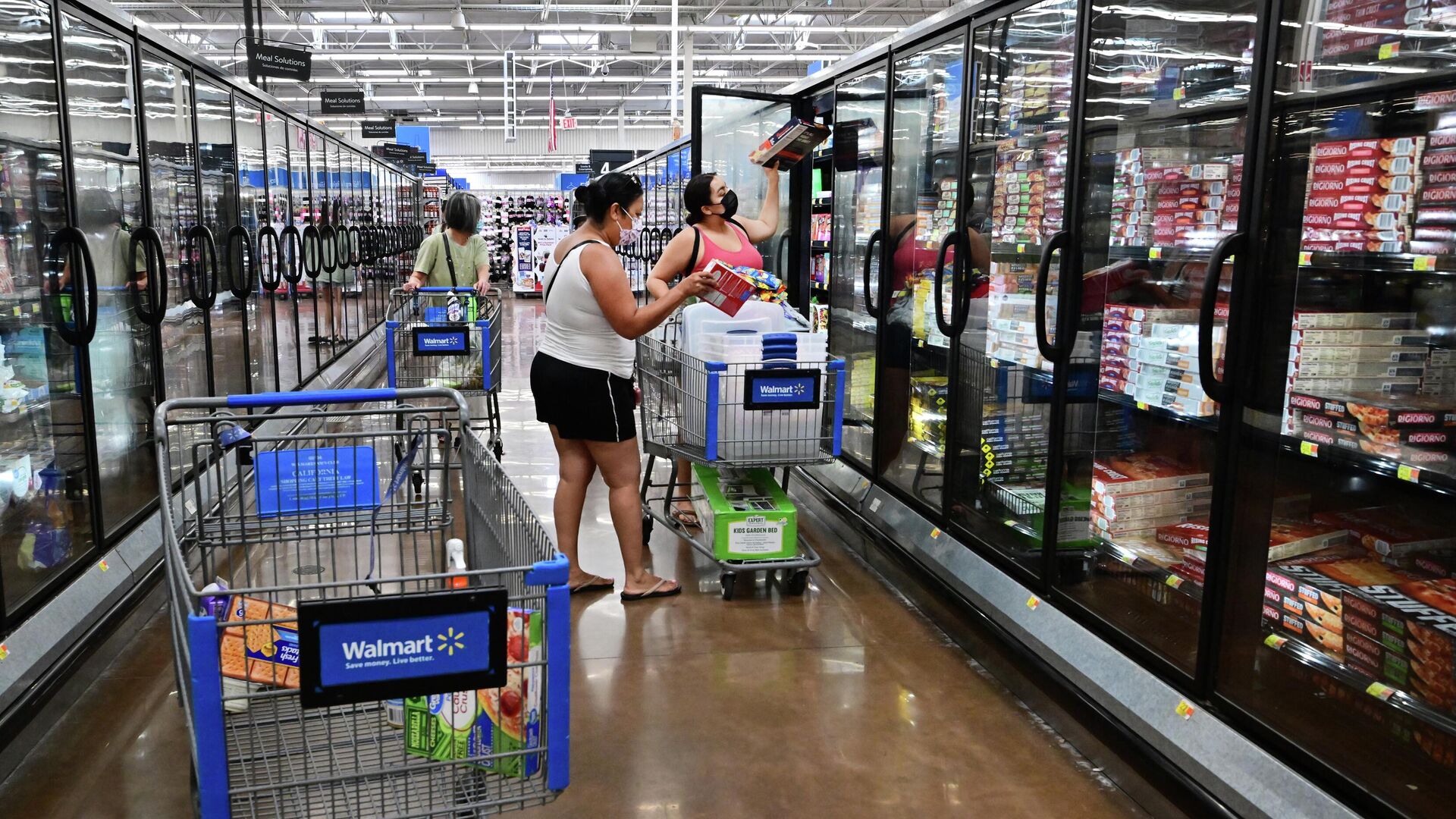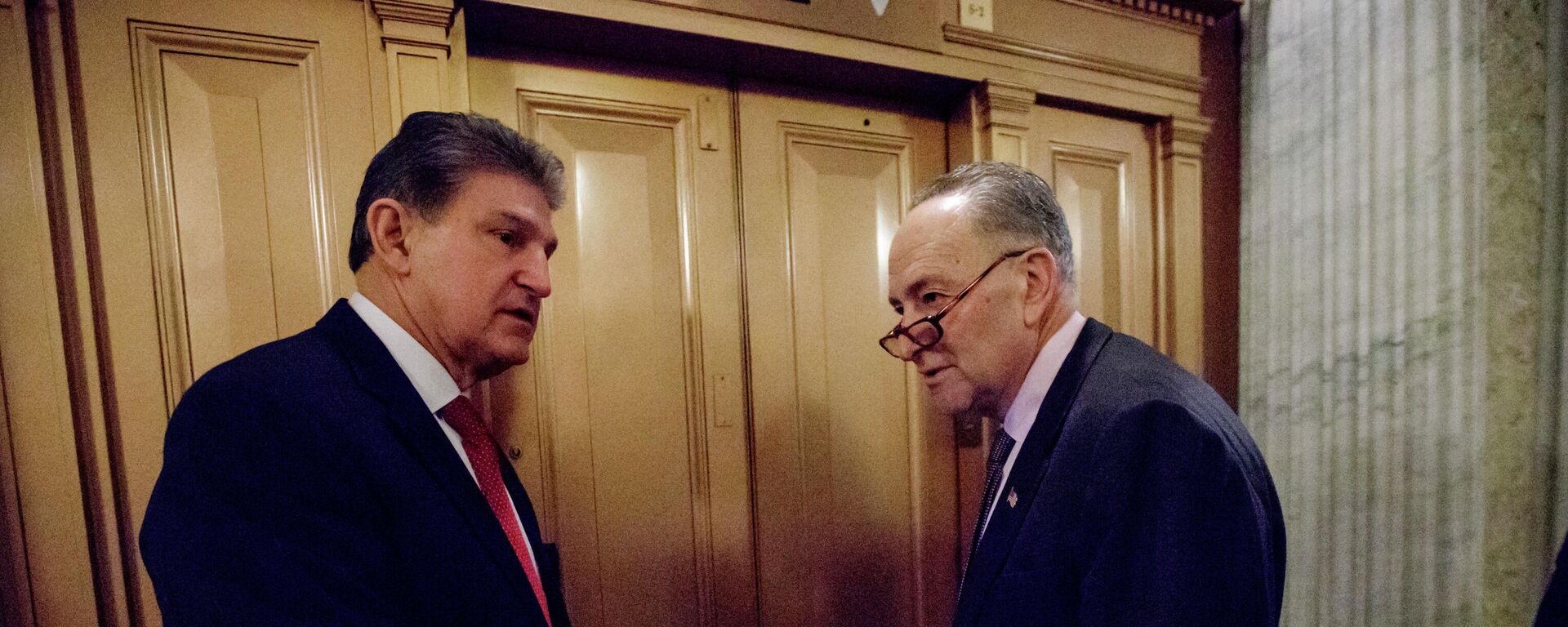https://sputnikglobe.com/20220801/republican-senator-says-inflation-reduction-act-will-lead-to-a-worse-recession--1097990296.html
Republican Senator Says Inflation Reduction Act Will ‘Lead to a Worse Recession’
Republican Senator Says Inflation Reduction Act Will ‘Lead to a Worse Recession’
Sputnik International
Last week, Senate Majority Leader Chuck Schumer and Democratic Senator Joe Manchin announced that they had clinched a deal on a major piece of legislation that... 01.08.2022, Sputnik International
2022-08-01T06:20+0000
2022-08-01T06:20+0000
2022-08-06T13:36+0000
us
joe biden
sen. joe manchin (d-west virginia)
chuck schumer
bill
inflation
https://cdn1.img.sputnikglobe.com/img/07e6/07/0f/1097356523_0:0:3315:1865_1920x0_80_0_0_4a7a072ea30313864428d901651382e0.jpg
Republican Senator Bill Cassidy has argued that an energy and healthcare reconciliation bill, called the Inflation Reduction Act of 2022 and supported by Chuck Schumer and Joe Manchin, could lead to a recession despite its sponsors’ assertions that the bill would help tackle rising prices.“Much of what he says about this bill is just not true” the Republican added, referring to Manchin’s earlier comments on the ABC News, in which the West Virginia Democrat in particular reiterated his support of the bill after claims that the measure could increase inflation over a year and a half.Cassidy claimed that the bill would raise taxes and lead to higher costs for consumers, adding, “I think what we’re doing is inducing [manufacturers] to move to Asia. You can have a disinflationary program by causing a recession. I think this is going to lead to a worse recession.”Crapo pointed to an analysis conducted by the Congressional Joint Committee on Taxation (JCT), which also found that taxes would soar by about $16.7 billion on US taxpayers making less than $200,000 in 2023 and raise another $14.1 billion on those who earn between $200,000 and $500,000.Referring to the Manchin-Schumer deal, the Senate GOP argued that “Americans are already experiencing the consequences of Democrats’ reckless economic policies” and that “the mislabeled ‘Inflation Reduction Act’ will do nothing to bring the economy out of stagnation and recession.”Ashley Schapitl , a spokesperson for the Senate Finance Committee’s Chair Ron Wyden, in turn insisted that families “will not pay one penny in additional taxes under this bill.”Schapitl claimed that the JCT analysis isn’t complete because “it doesn’t include the benefits to middle-class families of making health insurance premiums and prescription drugs more affordable. The same goes for clean energy incentives for families.”This comes after Senate Majority Leader Schumer and Democratic Senator Manchin announced a deal last Wednesday on the energy and health care bill, a scaled-down version of the Build Back Better Act that the West Virginia Democrat Manchin repeatedly stymied last year.According to them, “the investments will be fully paid for by closing tax loopholes on wealthy individuals and corporations.” They added that the new agreement aims to "reduce carbon emissions by roughly 40 percent by 2030" and address inflation while also reducing the deficit.Republicans were quick to lash out at the agreement, with Texas Senator John Cornyn slamming the new document as “Manchin’s New Build Back Broke Bill”. Cornyn insisted that “Raising taxes on job creators, crushing energy producers with new regulations, and stifling innovators looking for new cures will only make this recession worse, not better.”In a separate development last week, President Joe Biden argued that the US economy is "on the right path" despite the GDP taking a plunge, and pushing the country into a technical recession.Earlier, the Commerce Department stated that the country’s GDP contracted by 0.9% in the second quarter of this year after a first quarter drop of 1.6%, in a preliminary estimate that technically placed the economy in a recession.This followed the White House arguing that “while some maintain that two consecutive quarters of falling real GDP constitute a recession, there are other factors that need to be taken into account. Conservatives were having none of it." The claims provoked flak from Republicans, with Donald Trump Jr. tweeting that “apparently the White House is changing the definition of recession this week so we can pretend that we're not in one.”
https://sputnikglobe.com/20220727/joe-manchin-chuck-schumer-reach-deal-on-climate-energy-and-taxes-in-surprise-announcement-1097870873.html
Sputnik International
feedback@sputniknews.com
+74956456601
MIA „Rosiya Segodnya“
2022
Oleg Burunov
https://cdn1.img.sputnikglobe.com/img/07e4/09/0b/1080424846_0:0:2048:2048_100x100_80_0_0_3d7b461f8a98586fa3fe739930816aea.jpg
Oleg Burunov
https://cdn1.img.sputnikglobe.com/img/07e4/09/0b/1080424846_0:0:2048:2048_100x100_80_0_0_3d7b461f8a98586fa3fe739930816aea.jpg
News
en_EN
Sputnik International
feedback@sputniknews.com
+74956456601
MIA „Rosiya Segodnya“
Sputnik International
feedback@sputniknews.com
+74956456601
MIA „Rosiya Segodnya“
Oleg Burunov
https://cdn1.img.sputnikglobe.com/img/07e4/09/0b/1080424846_0:0:2048:2048_100x100_80_0_0_3d7b461f8a98586fa3fe739930816aea.jpg
us, joe biden, sen. joe manchin (d-west virginia), chuck schumer, bill, inflation
us, joe biden, sen. joe manchin (d-west virginia), chuck schumer, bill, inflation
Republican Senator Says Inflation Reduction Act Will ‘Lead to a Worse Recession’
06:20 GMT 01.08.2022 (Updated: 13:36 GMT 06.08.2022) Last week, Senate Majority Leader Chuck Schumer and Democratic Senator Joe Manchin announced that they had clinched a deal on a major piece of legislation that Democrats say aims to reform the tax code, tackle climate change and reduce health-care costs.
Republican Senator Bill Cassidy has argued that an energy and healthcare reconciliation bill, called the Inflation Reduction Act of 2022 and supported by Chuck Schumer and Joe Manchin, could lead to a recession despite its sponsors’ assertions that the bill would help tackle rising prices.
Speaking to ABC News on Sunday, Cassidy said that “It [the bill] may be disinflationary by causing a recession. They’re interjecting an incredible amount of uncertainty into the economy just as we entered a recession.”
“Much of what he says about this bill is just not true” the Republican added, referring to Manchin’s earlier comments on the ABC News, in which
the West Virginia Democrat in particular reiterated his support of the bill after claims that the measure could increase inflation over a year and a half.
Cassidy claimed that the bill would raise taxes and lead to higher costs for consumers, adding, “I think what we’re doing is inducing [manufacturers] to move to Asia. You can have a disinflationary program by causing a recession. I think this is going to lead to a worse recession.”
He spoke as Republican Senator Mike Crapo cited not-partisan data as indicating that the Manchin-Schumer deal on the reconciliation bill would “raise billions of dollars in taxes on Americans” earning less than $400,000 annually.
Crapo pointed to an analysis conducted by the Congressional Joint Committee on Taxation (JCT), which also found that taxes would soar by about $16.7 billion on US taxpayers making less than $200,000 in 2023 and raise another $14.1 billion on those who earn between $200,000 and $500,000.
Referring to the Manchin-Schumer deal, the Senate GOP argued that “Americans are already experiencing the consequences of Democrats’ reckless economic policies” and that “the mislabeled ‘Inflation Reduction Act’ will do nothing to bring the economy out of stagnation and recession.”
“The more this bill is analyzed by impartial experts, the more we can see Democrats are trying to sell the American people a bill of goods,” Crapo, who sits on the Senate Finance Committee as a ranking member and who requested the JCT analysis, asserted.
Ashley Schapitl , a spokesperson for the Senate Finance Committee’s Chair Ron Wyden, in turn insisted that families “will not pay one penny in additional taxes under this bill.”
Schapitl claimed that the JCT analysis isn’t complete because “it doesn’t include the benefits to middle-class families of making health insurance premiums and prescription drugs more affordable. The same goes for clean energy incentives for families.”
This comes after Senate Majority Leader Schumer and Democratic Senator Manchin announced a deal last Wednesday on the energy and health care bill, a scaled-down version of the Build Back Better Act that the West Virginia Democrat Manchin repeatedly stymied last year.
“After many months of negotiations, we have finalized legislative text that will invest approximately $300 billion in Deficit Reduction and $369.75 billion in Energy Security and Climate Change programs over the next 10 years,” the two senators said in a joint statement after clinching the deal.
According to them, “the investments will be fully paid for by closing tax loopholes on wealthy individuals and corporations.” They added that the new agreement aims to "reduce carbon emissions by roughly 40 percent by 2030" and address inflation while also reducing the deficit.
Republicans were quick to lash out at the agreement, with Texas Senator John Cornyn slamming the new document as “Manchin’s New Build Back Broke Bill”. Cornyn insisted that “Raising taxes on job creators, crushing energy producers with new regulations, and stifling innovators looking for new cures will only make this recession worse, not better.”
In a separate development last week,
President Joe Biden argued that the US economy is "on the right path" despite the GDP taking a plunge, and pushing the country into a technical recession.
“It's no surprise that the economy is slowing down as the Federal Reserve acts to bring down inflation. Even as we face historic global challenges, we are on the right path and we will come through this transition stronger and more secure,” POTUS said.
Earlier, the Commerce Department stated that the country’s GDP contracted by 0.9% in the second quarter of this year after a first quarter drop of 1.6%, in a preliminary estimate that technically placed the economy in a recession.
This followed the White House arguing that “while some maintain that two consecutive quarters of falling real GDP constitute a recession, there are other factors that need to be taken into account. Conservatives were having none of it." The claims provoked flak from Republicans, with Donald Trump Jr. tweeting that “apparently the White House is changing the definition of recession this week so we can pretend that we're not in one.”





